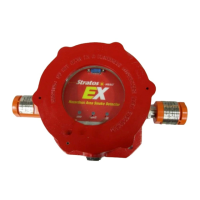Chapter 3: Installation
22 Stratos EX Hazardous Area Aspirating Smoke Detection System Installation Manual
Installation
Before installing the detector, the local standards for hazardous areas and for
installation of aspirating detection systems must be consulted, as these
standards differ throughout the world. Specific advice for one country may not be
applicable to another. The following is a brief set of guidelines on installing
detectors.
1. The detector will normally be mounted at a level where there is easy access
to the unit for configuration and programming.
2. Pipework should be metal and bonded to earth/ground to eliminate static
electricity buildup. Selection of pipe is left to the site engineers, but the
internal diameter should be between 20 and 25mm.
3. The exhaust air from the unit must not be impeded in any way. If the unit is
mounted in a different air pressure from where the air is being sampled (for
example an air duct), then a pipe must be taken from the exhaust port back to
the same air pressure zone as the sampling holes.
4. Sampling holes should be free from burrs and swarf.
5. All signal cables must be screened and must be of a suitable type. The
specific type of cable will normally depend upon the local fire and hazardous
area regulations.
6. The unit must not be placed in areas where either the temperature or humidity
is outside the specified operating range.
7. The unit should not be placed in close proximity to any equipment expected to
generate high radio frequency levels (such as radio alarms) or units
generating high levels of electrical energy (such as large electric motors or
generators).
WARNINGS
• The apparatus is ATEX CAT 2, only to be installed in Hazardous Area Zone 1
or Hazardous Area Zone 2.
• The installer is to ensure that the equipment is located in areas that are
known not to have an adverse effect on the housing material.
• Do not modify the enclosure or component parts as this will compromise the
apparatus certificate.
• The area in which the detector may be mounted must be in accordance with
the certification of the apparatus and in accordance with the standards of the
appropriate authority in the country concerned.
• Local standards for the installation of aspirating detection systems must be
consulted.
• The detector should normally be mounted at a level where there is easy
access to the unit for configuration and programming.

